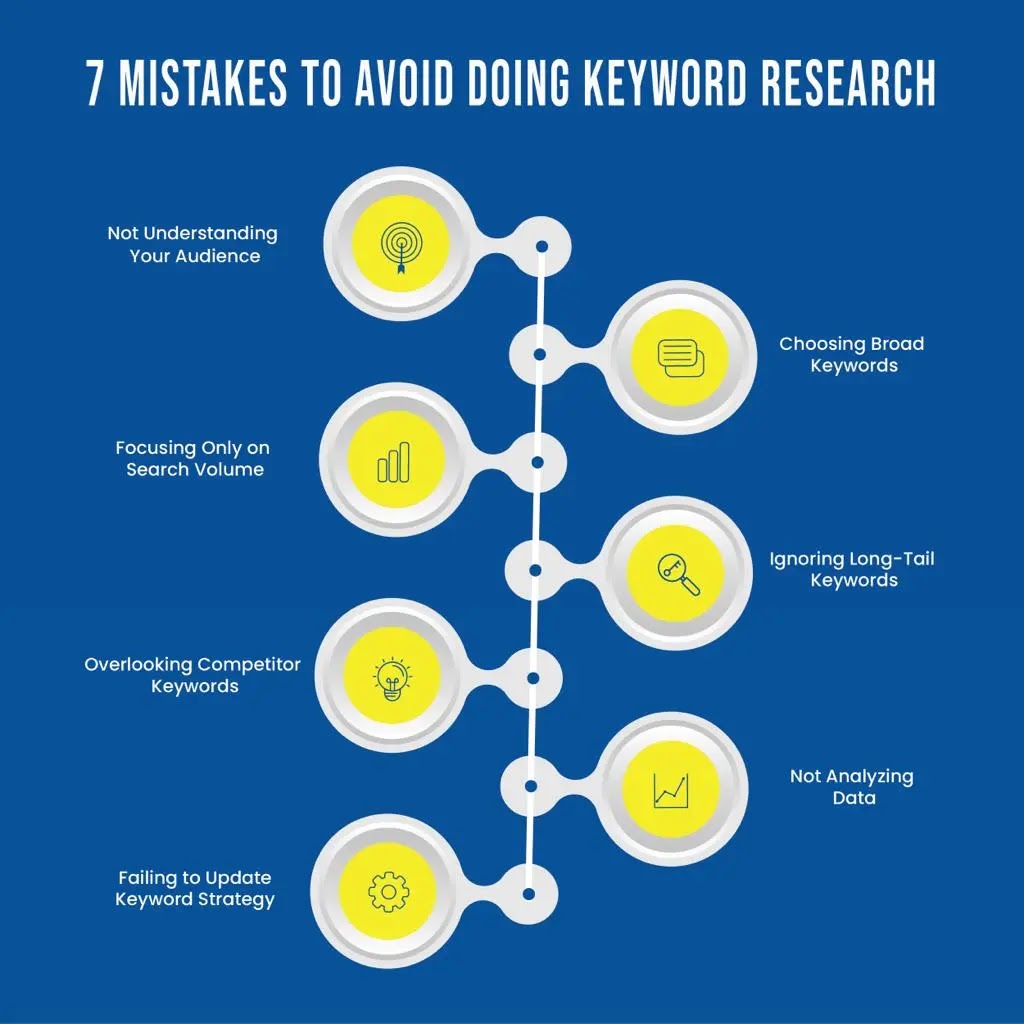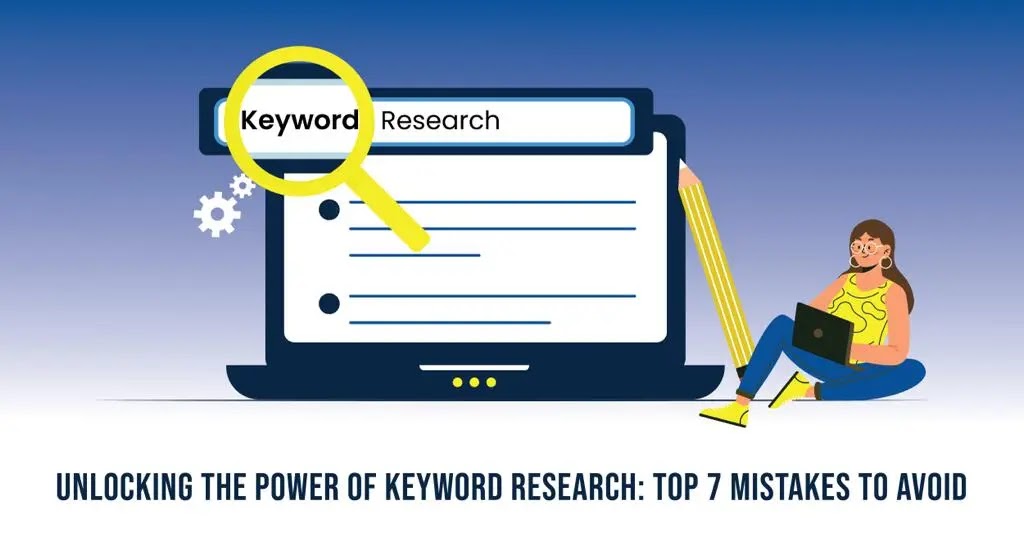When you are running an online business, “Think about what the user is going to type.”
Keyword research is unavoidable when discussing digital marketing. Most SEO marketing campaigns begin with keyword research. (Or at least they should).
Keyword research is the act of discovering and analyzing the words and phrases that people use to search for information online. It assists you in identifying the terms that people use to search for products and services online, allowing you to develop content that fits their demands.
Keyword research is essential since it helps boost search engine rankings, increase website traffic, and increase conversions.
In this blog, we will go through the top 7 mistakes you may be making when conducting keyword research.

Mistake #1: Not Understanding Your Audience
The first and most common mistake in keyword research is not fully understanding the audience and their search intent. If you don’t understand your audience, you won’t know what they’re looking for, making keyword research more difficult.
To avoid making this mistake, begin by defining your target audience. Who exactly are they? What are their needs? What language do they use to search for any query? Once you’ve defined your target audience, use tools like Google Trends to analyze search trends.
After knowing the audience, the next most common mistake many individuals make in this context is failing to understand the user intent. That is the reason why the user is looking for a specific keyword. This allows you to target transactional keywords as well as terms more related to your products or services.
Mistake #2: Choosing Broad Keywords
The second common mistake is targeting broad keywords. Broad keywords are general terms with a wide range of meanings. “Shirts,” for example, is a broad keyword that might relate to any type of shirt.
Many people believe that generic keywords are an effective approach to rank. After all, it’s a broad term with a significant amount of searches. The problem with wide keywords is that they can boost your website’s visibility but not the quality of traffic. This increases the bounce rate and lowers the return on investment (ROI).
Furthermore, competition for broad keywords is high, making it tough and costly to rank for these terms. Because many businesses are targeting these keywords, you will have to spend greater advertising prices and work on SEO more regularly. This raises the expense of website maintenance.
Instead of utilizing broad keywords, concentrate on specific ones. “Casual check shirts,” for example, is a focused keyword. Although focused keywords have a small search volume, their ROI is substantial.
This is not to say that wide keyword should be avoided.
Broad keywords can be used to raise brand awareness but do not provide valuable traffic; on the other hand, focused keywords have a low search volume but generate targeted traffic.
Mistake #3: Focusing Only on Search Volume
Another common mistake people make when conducting keyword research is focusing on the search volume of a keyword. The amount of times a keyword is searched for on search engines in a given month is referred to as search volume.
Yet, search volume does not always imply high-quality or valuable traffic. There are several issues with focusing solely on high-search volume keywords.
To begin with, high-volume keywords do not always result in valuable traffic. The majority of the traffic they create is unrelated or uninterested in your products or services. These users exit the website quickly, increasing your bounce rate.
Second, high-volume keywords typically have significant competition. This indicates that many other businesses and websites are attempting to rank for that keyword, making ranking on high-volume keywords tough and expensive.
Finally, search volume can change with the seasons. For example, during the month of December, keywords such as “Christmas trees” receive a high volume of searches, but after December, these terms become outdated.
Hence, instead of focusing solely on keywords with high search volume, consider other metrics such as relevancy, keyword difficulty, click-through rate (CTR), and so on while conducting effective keyword research.
Mistake #4: Ignoring Long-Tail Keywords
The fourth mistake that most individuals make while conducting keyword research is neglecting long-tail keywords, despite the fact that they have lower search volume than broad keywords. Ignoring long-tail keywords means passing up opportunities to bring highly targeted traffic to your website.
Broad keywords attract general traffic, the majority of which will not be valuable, but long-tail keywords are more specific, and those who are searching for something specific are more likely to be towards the end of the buying process and ready to make a purchase.
Furthermore, broad keywords have a high level of competition, thus ranking for those keywords will require a comprehensive SEO strategy. Long-tail keywords, on the other hand, have minimal competition and can easily rank higher.
By including long-tail keywords in your content, you will not only enhance the likelihood of being found by those who are especially looking for what you offer, but you will also increase the relevancy of your content to both users and search engines.
Thus, don’t underestimate or dismiss the potential of long-tail keywords – they could be the missing element you’re looking for to boost your online presence from good to great!
Mistake #5: Overlooking Competitor Keywords
Another common mistake people make when conducting keyword research is ignoring competitors’ keywords. Because your competitors are most likely targeting the same audience as you, it is critical to research competitor keywords to see what terms they are targeting.
Tools such as MOZ and Ahrefs can be used to discover competitor keywords. Look for the keywords that your competitors are ranking for and how they are employing them in the content on their websites. Fill in the blanks in your content using this information.
Be careful not to just duplicate the keywords of your competition. Use them to create your own distinctive, high-quality content. Furthermore, focusing on keywords that your competitors are overlooking will offer you an advantage over them.
Yet, if you do not research the keywords of your competitors, you may end up targeting unrelated keywords and gaining invaluable traffic.
So concentrate on your competitors’ keywords because they are the ones you want to beat for first place on SERPs.
Mistake #6: Not Analyzing Data
You should know that keyword research is not a one-time event; it is an ongoing effort, just like SEO. Once you’ve integrated keywords into your content, your work isn’t done. It takes ongoing analysis and refinement.
You won’t know which keywords are bringing in the most traffic to your website unless you analyze the data. Data analysis tools such as Google Analytics can assist you. This will show you all of the terms for which Google is displaying your website in the SERPs.
You can also check the bounce rate and the amount of time users spend on your website using Google Analytics. This will tell you whether the keywords you’re using are effective.
Hence, after conducting keyword research, always analyze data at regular intervals to evaluate if the keywords require improvement.
Mistake #7: Failing to Update Keyword Strategy
The final mistake that most individuals make after conducting keyword research is failing to update their keyword strategy over time. As search engine algorithms, search behavior, and trends change, it is critical to adjust your keyword strategy to remain relevant and attract the right audience.
If you do not change your keyword strategy, your content will become irrelevant, you will lose website traffic, your ranking in SERPs will suffer, and you will miss out on opportunities to develop your business.
To refresh your keyword strategy, examine website statistics, conduct new keyword research, and stay current on industry changes. In addition, keep an eye on your competitors’ keyword strategies and adapt yours accordingly.
Conclusion:
Keyword research is a vital step in any digital marketing strategy. Whether it’s SEO or PPC, getting it right can take your business to new heights. But beware, making mistakes during the process can land your business in a pitfall of invisibility and irrelevancy.
The most common mistakes people make are failing to understand search intent, ignoring long-tail keywords, and focusing solely on broad keywords with high search volume. Neglecting other crucial factors such as keyword difficulty and relevancy can also cause problems. Some may think that once they’ve completed their keyword research and embedded them in their content, the job is done. But, in fact, keyword research is an ongoing process that requires regular analysis and updates to stay on top of the latest trends and search behaviors.
Avoid these common mistakes in your keyword research and watch your website soar high in the SERPs. Be sure to check out our guide for conducting effective keyword research.
Have you made any of the above-mentioned mistakes, or have you encountered other issues while conducting keyword research? Share your thoughts in the comments below!




Very informative article. Thanks for publishing